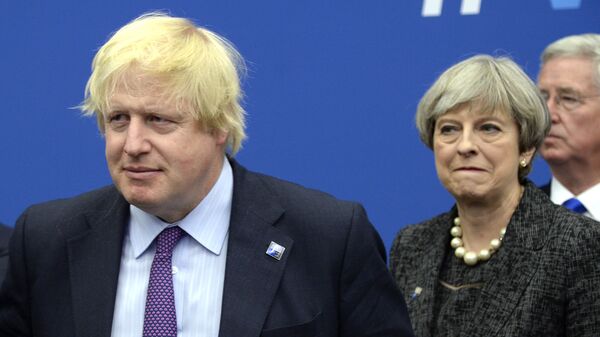According to The Times, former UK Foreign Secretary Boris Johnson has accepted an invitation to a 1,000-strong rally to be hosted by the Tory grassroots group Conservative Home next month.
His will reportedly deliver the address a day before Theresa May's keynote speech at the annual party conference in Birmingham on October 3. Although Johnson hasn't decided on the subject of his speech yet, his move is understood to confront the prime minister's Brexit stance.
Boris Johnson, a die-hard Brexiteer who quit the cabinet in July to protest Theresa May's Chequers proposal, has recently rallied his fellow Conservatives to "chuck Chequers," and described her negotiating strategy as "white flag fluttering."
READ MORE: May Strikes Back: UK PM Launches Scathing Attack Against Boris Johnson
However, a two-page dossier seen by The Times and handed out to ministers in No. 10 cited progress in the Theresa May-led Brexit talks with Brussels. The document insisted that "Nobody else in British politics has a detailed plan for our future relationship that delivers on the instruction of the British people and is negotiable with the EU." It concludes: "It's time to come together, agree a pragmatic Brexit that most people can support, and get on with it."
A Tory source described the handout as a "hatchet job on Boris Johnson." However, Johnson's ally said that this claim was not true, as EU chief negotiator Michel Barnier rejected May's proposal and argued that London and Brussels needed a Norway or Canada-style agreement. "May is now doing what no one thought possible, by uniting the Tory party, but sadly for her it's against her flagship policy."
The Chequers proposal was published in July to present Theresa May's vision of post-Brexit relations with the EU. Under it, London and Brussels would set up a free trade area, based on a "common rulebook" that will see both parties adopt the same standards on goods and which would spare the need for customs and regulatory border checks. At the same time, May wanted London to have its own trade policy outside the customs union; the EU has rejected the idea amid concerns that it would undermine the European single market.
London and Brussels are also stuck on the issue of the Irish border. The EU offered to keep Northern Ireland in the single market and set up a hard border between the region and the rest of the country, but Britain didn't accept it, citing constitutional integrity concerns. This comes less than seven months before the UK's looming departure from the bloc on March 29 next year. If the EU and the UK fail to negotiate a deal, they would have to trade on bare WTO terms, which would mean economic difficulties for several sectors of the economy, including food, air transport, and pharmaceutics.



